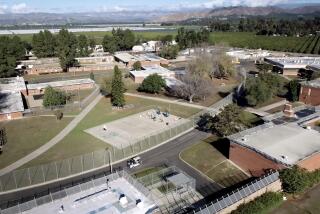Distinguish Between Felons and Truants : Juvenile justice: Redesign the system to deal with today’s increasingly violent realities.
- Share via
The juvenile justice system is failing to protect us from the surge in violent crimes committed by young people.
The patchwork of laws put on the books over the past 30 years isn’t working. One problem is that the system was designed to help troubled youth who committed minor offenses, but 75% of the current cases in juvenile court are felonies. We need to act immediately to replace it with a coherent program that protects society from violent juvenile criminals, efficiently rehabilitates youths who can be saved--and also knows how to tell the difference.
Here are some principles that could form the core of a revision:
* Remove many violent offenders from the juvenile system. Violent youths who are 17 years old should be sent directly to adult court. Last year, about 50% of the juveniles referred to the Probation Department for possible criminal offenses were 17 years old. So were many juveniles charged with the most serious crimes.
Prosecutors should have discretion to transfer even much younger juveniles accused of the most serious crimes to adult courts. State legislators have proposed lowering the age at which a youth can be tried as an adult from 16 to 14, but the numbers matter less than letting prosecutors use their own judgment. For instance, a 15-year-old is currently in juvenile court, accused of a double murder. If the murders had occurred nine days later, on his 16th birthday, he could have been tried as an adult and, if convicted, sentenced to life without the possibility of parole. Convicted juvenile offenders must be freed by age 25.
* Limit juvenile confidentiality. Society needs to identify juveniles who commit serious crimes and know what happens to them in court. Improvements have been made over the years, but there are still instances where agencies charged with providing services to children are not aware of criminal proceedings involving a child. School officials, for instance, concerned about violating confidentiality laws, have often not told teachers about students who had been convicted of crimes.
* Deliver real rehabilitation. Juvenile justice has to efficiently deliver rehabilitative services to juveniles who commit minor offenses. The first step is coordination among all the agencies that assist young people at risk. We need to identify and help the growing number of children who have never had structure or hope in their lives. Government can also offer parents help with parenting skills and intervention before the family structure falls apart.
The present juvenile system puts truants and murderers through the same procedures, including the appointment of attorneys at public expense and long judicial hearings. We need laws that allow better choices between punishment and guidance, and that use resources more wisely.
* Make juveniles--and their parents--accountable. Punishment that fits the crime must be meted out fairly and with certainty. Currently, juvenile burglars are often sent straight home on probation while adults who commit the same offense get a mandatory prison sentence; this sort of thing makes juvenile offenders believe they can get away with almost anything.
Parents must be held responsible for keeping their children in school. We can enforce violations of the Education Code and at the same time assist parents with “stay in school” programs. Parents must also pay for the damage their children cause, including the cost of graffiti cleanups. Current law provides for restitution of up to $10,000 to victims of juvenile crime. New laws should simplify this recovery and reinforce parental responsibility, while also offering parenting assistance.
* Intervene early to prevent violence later. This is the most important step we can take to stop juvenile crime. Legislators need to change the laws that prohibit and punish as well as provide programs and funding to give children the skills and motivation to stay in school and away from gangs, drugs and crime.
* Keep juveniles away from guns. We must substantially stiffen laws and penalties for juveniles in possession of guns and for adults who make guns available to juveniles. No loopholes, no exceptions.
A new juvenile justice system would quickly reduce the level of fear we all feel. Over the long term, it would reduce the number of juvenile and adult violent criminals. We need to put reformers to work right away and give them a time limit, no more than 180 days, to produce a framework for a new juvenile justice system. I offer one of my senior prosecutors to this effort.
The reformers should be nonpartisan; this is not about politics. It is about making California a safe, desirable place to live.
More to Read
Sign up for Essential California
The most important California stories and recommendations in your inbox every morning.
You may occasionally receive promotional content from the Los Angeles Times.













